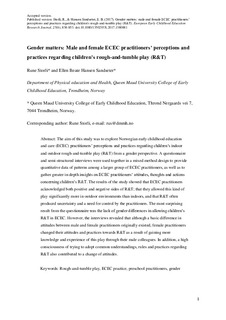Gender matters: male and female ECEC practitioners’ perceptions and practices regarding children's rough-and-tumble play (R&T)
Journal article, Peer reviewed
Accepted version
Permanent lenke
http://hdl.handle.net/11250/2562481Utgivelsesdato
2017Metadata
Vis full innførselSamlinger
- Artikler (Articles) [173]
Originalversjon
Storli, R & Sandseter, E. B. H. (2017). Gender matters: male and female ECEC practitioners’ perceptions and practices regarding children's rough-and-tumble play (R&T). European Early Childhood Education Research Journal. 25(6), 838–853. 10.1080/1350293X.2017.1380881Sammendrag
The aim of this study was to explore Norwegian early childhood education and care (ECEC) practitioners’ perceptions and practices regarding children’s indoor and outdoor rough-and-tumble play (R&T) from a gender perspective. A questionnaire and semi-structured interviews were used together in a mixed method design to provide quantitative data of patterns among a larger group of ECEC practitioners, as well as to gather greater in-depth insights on ECEC practitioners’ attitudes, thoughts and actions concerning children’s R&T. The results of the study showed that ECEC practitioners acknowledged both positive and negative sides of R&T; that they allowed this kind of play significantly more in outdoor environments than indoors, and that R&T often produced uncertainty and a need for control by the practitioners. The most surprising result from the questionnaire was the lack of gender differences in allowing children’s R&T in ECEC. However, the interviews revealed that although a basic difference in attitudes between male and female practitioners originally existed, female practitioners changed their attitudes and practices towards R&T as a result of gaining more knowledge and experience of this play through their male colleagues. In addition, a high consciousness of trying to adopt common understandings, rules and practices regarding R&T also contributed to a change of attitudes.
